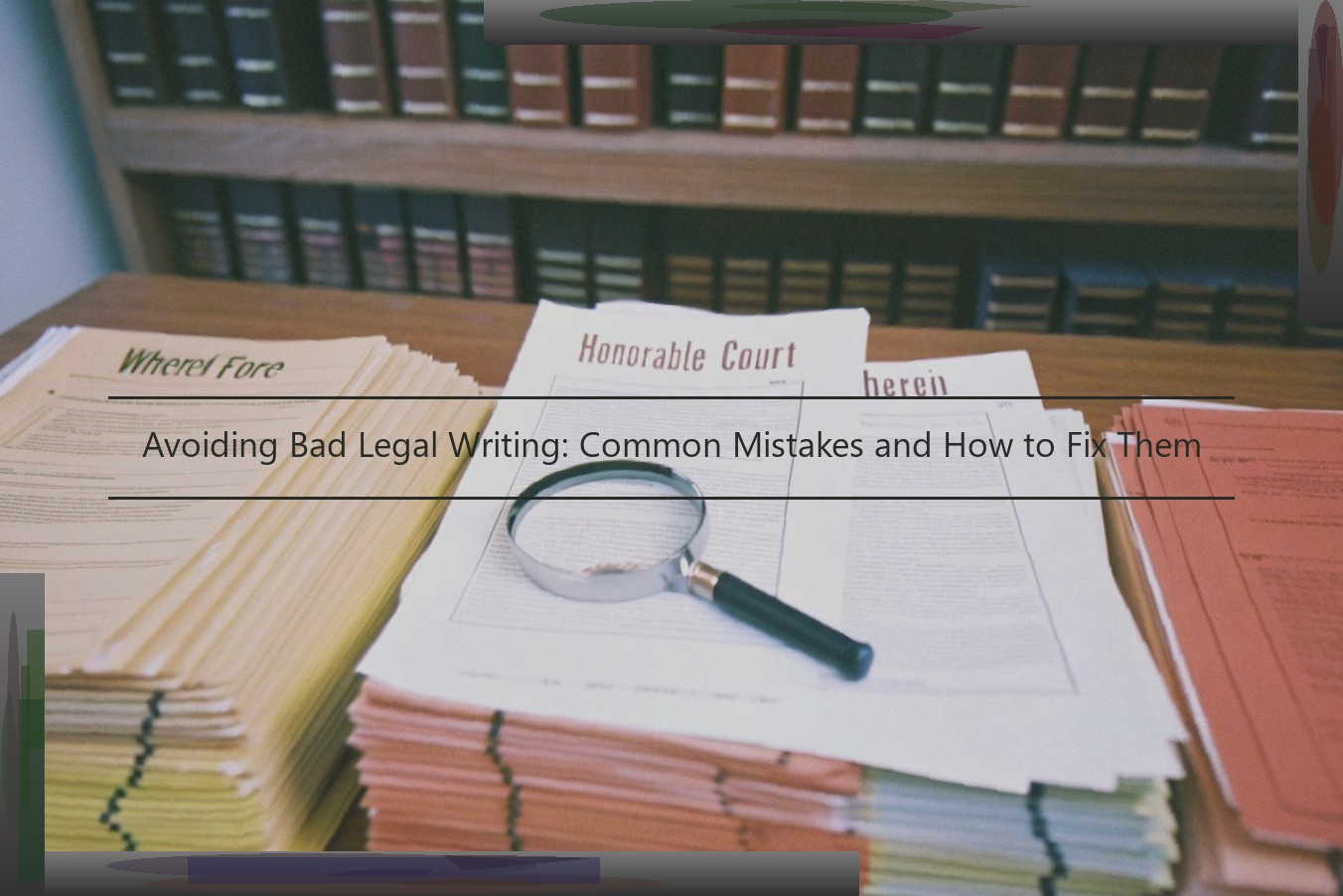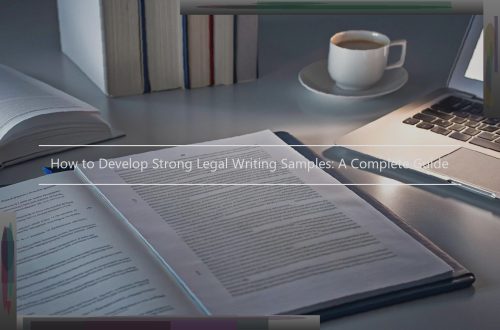Avoiding Bad Legal Writing: Common Mistakes and How to Fix Them
Characteristics of Bad Legal Writing
Bad legal writing can be characterized by overly complex sentences, convoluted legalese, and an overuse of jargon. These elements not only create ambiguity but risk losing the attention of judges and jurors who may be unfamiliar with legal nuances.
Consider the following sentence: "WHEREFORE, Plaintiff would respectfully pray that this Honorable Court would enter an Order consistent with the allegations herein contained." This sentence is convoluted due to unnecessary formality. "Honorable" can be a modifier, and there is no need to plead "respectfully" in this context. The word "would" also shouldn’t be used, because it can be repealed by timing. Instead of "would , " write "should" or "prays" to avoid the ambiguity. It’s best to write "Court" instead of saying "This Honorable Court," as this makes the clause redundant. Don’t use "who," "where," or "whereby," "prays," "requests," or "asks," as these words can be omitted. Also, "herein" should be avoided, even though it appears at the beginning of the Complaint. The word "herein" doesn’t truly aid the reader; in fact, it serves as a substitute for a noun.
Poor legal writing that places value on form over substance is not only imprecise but makes the reader’s job almost impossible. Some examples of poor legal writing include:

Types of Bad Legal Writing
The stakes for legal practitioners are higher than ever with the consequences of poor legal writing extending far beyond lackluster arguments and poorly structured narratives. The art of legal writing contributes in many ways to the ultimate success of a case, so there is much to be lost if rules or conventions are disregarded. Poorly written or overly complicated legal documents can waste the time of all participants involved, including clients, attorneys, experts, and judges. In the worst cases, poor legal writing can even lead to loss of the case. Lackluster legal writing can also affect the attorney-client relationship, especially if a client cannot easily understand a poorly written document, or if an attorney spends extra time correcting poor legal writing due to lack of professionalism or care in drafting. Avoiding bad legal writing is a skill every legal practitioner should strive to attain. The stakes for attorneys are high and the intended effects of good legal writing can be severely undermined by the impetuous or misguided author.
Consequences of Bad Legal Writing
There are a litany of examples that may qualify as bad legal writing. From briefs to contracts to pleadings and beyond, the following are examples of what you should avoid.
Briefs
Is the jury the finder of fact or the judge?
You the undersigned do further certifiy
It is denied by the defendant
It is therefore respectfully requested that this Honorable Court grant the request of the defendant and dismiss the Complaint
The defendant is entitled to a dismissal of the complaint in the cause at bar for the reason of contributory negligence on the part of the plaintiff.
a. The plaintiff carelessly, recklessly and with no thought for her own safety proceeded to cross the street at a time and place where a tractor-trailer was proceeding legally and in conformity with the laws of the state of North Carolina and the local ordinances of the city of High Point, North Carolina; and
b. The plaintiff failed to pay any attention whatsoever to the tractor-trailer which at all times was in full view of the plaintiff who was able to see and observe the tractor-trailer in ample time to have avoided being struck by the tractor-trailer and to have safely completed her crossing of the street.
WHEREFORE, defendant Hughes Roberts Column requests a judgment dismissing the Complaint with prejudice and for such other and further relief as the Court may deem just and proper.
Contracts
Purchaser shall commencing March 9, 2007, pay to Seller, in cash or certified check, at the offices of Seller at 55 East 52nd Street, New York, New York, the purchase price of One Million Three Hundred Thousand ($1,300,000) Dollars.
THE LAND SHALL BE LEASED TO PURCHASER under the terms and conditions set forth in Article III hereof for a term of thirty (30) years commencing on the date hereof unless the same shall be sooner terminated as hereinafter provided.
The Purchaser shall have the right of nearly certain redemption at the end of any period as set forth in Section 3.02 above.
Plaintiffs’ claims as set forth in the complaint should be dismissed at Defendant’s request and absent an oral argument on the Motion to Dismiss because Plaintiffs have failed to express in the complaint the facts that would give rise to plausible claims for relief and due process rights as required under the standards applicable under Bell Atlantic v. Twombly, 550 U.S. 544(2007) and its progeny.
More hilariously, there are far too many to post. And ones much worse than this, but inquiring minds must look for them.
Taking Lessons from Bad Legal Writing
As any legal professional knows all too well, legal writing is often dull, dense, and unnecessarily complicated. Yet some legal writing is so bad it’s a wonder how it got past anyone’s desk. Though the quality of such writing grates on the nerves and tempts the reader to recoil, a careful look at the ways in which such writing miscarries may help legal professionals learn what not to do. Understanding the pitfalls of what makes bad legal writing helps lawyers and other legal professionals avoid these errors and strive for greater clarity and persuasiveness.
To begin with, lawyers and other legal professionals should understand that their writing will be held to the same standards as any other persuasive or expository writing, such as in journalism or in a business report. Judges want lawyers to be persuasive, and they want their decisions to be based on persuasive arguments. As a result, lawyers cannot hide behind legalese, legal jargon, and legalese when it suits them. Instead, lawyers must explain their arguments in clear and succinct language that the judge can understand. Every word and phrase should count, and every thought should be processed in a way that makes it clear how it fits with the overall argument. Having clarity in legal writing just makes it easier for a lawyer to win their case, since the judge will be persuaded by the lawyer’s well-documented and well-spoken case as stated in the legal writing.
Moreover, using bad examples of legal writing can serve as useful tools to help lawyers improve their legal writing. So taking the time to consider these examples seriously and identifying what makes these court rulings or legal writing effective or ineffective will help lawyers and other legal professionals avoid the same pitfalls.
For example, one of the most famous examples of such writing came from a New York City Court of Appeals certain about the dismissal of the suit in favor of the defendant. In this ruling, the Court held, "This agreement cannot be construed as imposing a condition precedent on the insured, for such intent is to be ascertained not merely from the expressed words of the contract." While the Court obviously had reasons for dismissing the lawsuit, it did not clearly state what those reasons were. The reason was very difficult to discern from the text of the Court’s decision, and even the most seasoned legal professionals would have difficulty making sense of it. However , the best lawyers know that it is not enough to simply state their position; rather, they must clarify it in plain English so there is no misunderstanding by the reader.
Similarly, in a brief opinion, a New York County Supreme Court judge decided that an individual had failed to prove her case beyond a reasonable doubt. In doing so, the Judge dismissed the entire legal matter in three sentences without any explanation of how the plaintiff had failed to provide sufficient evidence to prove her case. Simply because the Judge was able to reach the right outcome does not make this legal writing an example of good legal writing. Rather, the Judge’s decision to issue such sparse writing at the trial court level made it difficult for the plaintiff to understand the reasons why her case had been dismissed. In fact, even a seasoned trial lawyer would have difficulty properly interpreting the Judge’s reasons for dismissing the case.
Obviously, this is not to say that lawyers must always use big words rather than small ones. Rather, it is to say that lawyers must communicate their thoughts concisely and clearly, and the big words and larger legal phrases should be used only when it is clear what the lawyer actually means. While using smaller words may help make a lawyer’s writing more efficient, there is no threshold that must be met in order for a lawyer’s writing to be considered effective.
Just as in any other type of writing, clear legal writing must be concise. A legal professional must take the time to provide only as much detail and only as much information as necessary to tell her story. While it can be helpful for lawyers to be as thorough as possible when providing substantive support for their positions, it is not always necessary for lawyers to thin their arguments down to a few pages. However, having said that, lawyers also should take care not to simply fill their writing with legalese, legaleze, and passable legal writing just to fill up pages. Sufficient detail is needed in legal writing, but no more than is necessary.
As long as lawyers are careful not to make their writing too complex, they will be able to continue enjoying the benefits of persuasive and effective legal writing. Thus, by taking note of the bad examples presented above, legal professionals will be able to take their writing to the next level and engage readers in their legal writing.
Resources to Combat Bad Legal Writing
Fortunately, there are substantial tools and resources available to help legal professionals enhance their writing skills and reduce the number of mistakes that can make for tedious reading.
I have developed a free writing guide for legal professionals that you can download from this website. While you’re at it, you may also want to check out Brian Gardner’s excellent "Lawyer’s Guide to Better Legal Writing." I read this four years ago during my forensic exam preparation for becoming an expert witness in a post-Miranda interrogation case and it served as a great resource in helping me prepare my deposition and trial testimony.
There are also numerous websites geared toward improving writing skills. Does every law firm have a ‘Wordsmith’? The Virginia Bar Association examines how to overcome common errors in writing strategy and calls the author, Elizabeth Christian a ‘Wordsmith.’ She talks about how to overcome some of the common pitfalls that come with legal writing and offers additional resources to help legal professionals develop better strategies to avoid such pitfalls.
With respect to online courses , there are hundreds of resources that can help you with legal writing strategies. For example, Law Shelf has a short video on some common legal writing pitfalls that you should try to avoid. Lawyers sometime have difficulty writing about complex topics in a way that the public can understand, but the video lists several simple strategies that can help overcome the problem.
It’s important to realize that other than making sure that your writing is free of grammatical errors, the biggest pitfall that you need to be concerned with is losing your identity, which is the essence of your writing style and the unique voice that your audience needs to hear from you. In other words, when we lose touch with our unique ‘voice’ or worse yet when it gets overpowered by other writers, then we lose much of what makes us who we are which is why all the tools and resources in the world cannot help you if you are not being your own unique self.



